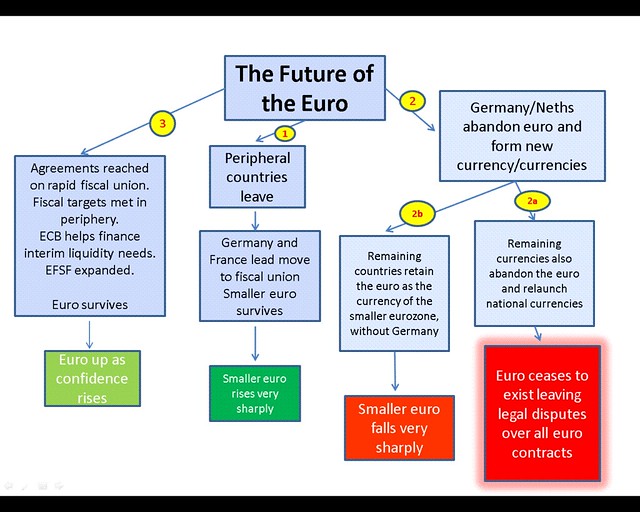Monday, January 30, 2012
Tiger picture of the day!
Sunday, January 29, 2012
Internet Slang 101: Troll
Example: "Don't listen to him, he's just trolling. It's obvious from the way he said the Jews caused 9/11."
(4) Comments
Neil Gaiman on Copyright and Piracy
Saturday, January 28, 2012
A sunny day in San Diego
I took a few hours off and went on a nice bike ride on a beautiful San Diego day, from Encinitas down the coast to the top of Torrey Pines, and back again. I borrowed a bike but wore the colors along the 101...
Parasurfing, or whatever it is called, along the beach at Cardiff.
I responded to the challenge and took the long hill in the Torrey Pines preserve, all the way to the top. On a borrowed bike. In sneakers with no clips. A month after I turned 50. I was quite self-satisfied at the top.
Bird of Paradise! Love these flowers...
(7) Comments
A conversation about the social right and a warning to the GOP
I've been off the blog for a few days on account of my duties as a corporate tool at my company's annual national sales meeting in San Diego. These are smart reps -- they are well educated and have to be credible and of value to neuro and orthopedic surgeons -- and, perhaps because of the Obama administration's relentless rhetorical, legislative, and regulatory assault on our great industry, they are, in the main, eager to vote against him come November. Many of them are also, however, extremely unhappy that social conservatives have captured the GOP, particularly on the subject of gay marriage.
Last night I had an interesting conversation in the hotel bar that hammered this home. This is a group that spends most their professional life in the operating rooms of hospitals supporting surgeons and nurses who save and improve lives, so they are almost certainly more thoughtful on complex ethical questions than most people. On the subject of abortion, my small sample had great sympathy for both sides of this fraught question and understood how it could legitimately animate passion in either direction. Unfortunately for the current GOP field, there was no such forgiveness of the opposition of leading Republicans to allowing states permit gay marriage. What could the objection possibly be? And whatever one's considered philosophical position, why does opposition to gay marriage, which at a minimum feels cruel, spark such passion? I wish I had an answer. For the life of me, I cannot understand the passion on the right for the subject. How do social conservatives talk to their gay friends about this subject? Or do they arrange their lives so they do not have gay friends?
Regardless, it is clear to me that the Republicans are making a huge political mistake by not accommodating themselves to the inevitability of gay marriage in many parts of the country and its ultimate federal recognition. I am persuaded beyond doubt that there is no issue that more alienates affluent voters who otherwise support core Republican values, and if the GOP waits too long to neutralize or "evolve" its position -- no actual endorsement of gay marriage is necessary, so much as dropping opposition -- it will do itself grave and lasting damage at the ballot box.
(69) Comments
Wednesday, January 25, 2012
Examining the SOTU, paragraph by paragraph
I watched the State of the Union so you do not have to. Suffice it to say, I have a few comments, pro and con, paragraph by paragraph.
Mr. Speaker, Mr. Vice President, members of Congress, distinguished guests, and fellow Americans:Uh, it is now named "Joint Base Andrews." Blowing this sort of thing is like screwing up a sports reference -- you are not going to endear yourself to the constituency to whom you are sucking up.Last month, I went to Andrews Air Force Base and welcomed home some of our last troops to serve in Iraq. Together, we offered a final, proud salute to the colors under which more than a million of our fellow citizens fought – and several thousand gave their lives.
We gather tonight knowing that this generation of heroes has made the United States safer and more respected around the world. For the first time in nine years, there are no Americans fighting in Iraq. For the first time in two decades, Osama bin Laden is not a threat to this country. Most of al Qaeda’s top lieutenants have been defeated. The Taliban’s momentum has been broken, and some troops in Afghanistan have begun to come home.The virtually wholesale embrace of George W. Bush's foreign policy objectives and indeed methods is one of my favorite things about President Obama. That he has spruced up assassination by drone with hope and change and multi-culti lingo that makes it go down better with the ferners only makes it more impressive.
These achievements are a testament to the courage, selflessness, and teamwork of America’s Armed Forces. At a time when too many of our institutions have let us down, they exceed all expectations. They’re not consumed with personal ambition. They don’t obsess over their differences. They focus on the mission at hand. They work together.Am I the only person who things it is more than a little hilarious -- or nauseating, I cannot decide which -- that Barack Obama is lionizing people "not consumed with personal ambition"? And, in any case, is it up to citizens in a democracy to "follow the example" of Navy SEALs? A wish, perhaps, for the sort of communal authoritarianism that has enthralled the American Left since the New Deal.Imagine what we could accomplish if we followed their example. Think about the America within our reach: A country that leads the world in educating its people. An America that attracts a new generation of high-tech manufacturing and high-paying jobs. A future where we’re in control of our own energy, and our security and prosperity aren’t so tied to unstable parts of the world. An economy built to last, where hard work pays off, and responsibility is rewarded.
We can do this. I know we can, because we’ve done it before. At the end of World War II, when another generation of heroes returned home from combat, they built the strongest economy and middle class the world has ever known. My grandfather, a veteran of Patton’s Army, got the chance to go to college on the GI Bill. My grandmother, who worked on a bomber assembly line, was part of a workforce that turned out the best products on Earth.Far be it from me to scorn the accomplishments of the "Greatest Generation," but was it such a great economic triumph to live prosperously when the rest of the world's industrial plant had been destroyed?The two of them shared the optimism of a Nation that had triumphed over a depression and fascism. They understood they were part of something larger; that they were contributing to a story of success that every American had a chance to share – the basic American promise that if you worked hard, you could do well enough to raise a family, own a home, send your kids to college, and put a little away for retirement.
The defining issue of our time is how to keep that promise alive. No challenge is more urgent. No debate is more important. We can either settle for a country where a shrinking number of people do really well, while a growing number of Americans barely get by. Or we can restore an economy where everyone gets a fair shot, everyone does their fair share, and everyone plays by the same set of rules. What’s at stake are not Democratic values or Republican values, but American values. We have to reclaim them.Neither party has done well by these principles, but in the end the only way for everybody to "play by the same rules" is for there to be many fewer rules. A vast regulatory burden always, or almost always, works to the benefit of the largest and most entrenched competitors who can afford the vast overhead required to comply. The more regulation, the less level the playing field. That does not mean that there may not be great reasons for regulation, but do not think that it ever involves "playing by the same rules."
Let’s remember how we got here. Long before the recession, jobs and manufacturing began leaving our shores. Technology made businesses more efficient, but also made some jobs obsolete. Folks at the top saw their incomes rise like never before, but most hardworking Americans struggled with costs that were growing, paychecks that weren’t, and personal debt that kept piling up.The United States remains the largest manufacturer in the world. Most of China's growth has come at the expense of other countries. However, the United States has maintained its manufacturing by becoming massively more productive. Today, American GDP is higher than it was when the Great Recession began, but there are millions fewer working. Why? Because productivity has soared. Yes, we need to get those people re-tooled and back to work in other jobs, but please, Mr. President, do not confuse success and failure.
In 2008, the house of cards collapsed. We learned that mortgages had been sold to people who couldn’t afford or understand them. Banks had made huge bets and bonuses with other people’s money. Regulators had looked the other way, or didn’t have the authority to stop the bad behavior.What does he mean that "mortgages had been sold to people who couldn't afford or understand them"? That institutional investors did not understand the securitized mortgages they were buying? Or that easy money led to so much competition among lenders that they lent money to people who could not or would not repay it? Quite confusing to the careful reader.
It was wrong. It was irresponsible. And it plunged our economy into a crisis that put millions out of work, saddled us with more debt, and left innocent, hard-working Americans holding the bag.The lending of that money was wrong, or the borrowing of it? Again, very confusing.
In the six months before I took office, we lost nearly four million jobs. And we lost another four million before our policies were in full effect.True, more or less. But the problem is not the job losses, it is the failure of the recovery compared to other recessions.
Those are the facts. But so are these. In the last 22 months, businesses have created more than three million jobs. Last year, they created the most jobs since 2005. American manufacturers are hiring again, creating jobs for the first time since the late 1990s. Together, we’ve agreed to cut the deficit by more than $2 trillion."Cut the deficit" compared to what? Your own laughable "baseline"? Yeah, I thought so.
And we’ve put in place new rules to hold Wall Street accountable, so a crisis like that never happens again.And yet no rules to prevent "too big to fail." So, really, a crisis like that can happen again.
The state of our Union is getting stronger. And we’ve come too far to turn back now. As long as I’m President, I will work with anyone in this chamber to build on this momentum. But I intend to fight obstruction with action, and I will oppose any effort to return to the very same policies that brought on this economic crisis in the first place.Agreed, but what in fact are those "very same policies"? I think they were incredibly loose money for way too many years. What do you think they were, Mr. President?
No, we will not go back to an economy weakened by outsourcing, bad debt, and phony financial profits. Tonight, I want to speak about how we move forward, and lay out a blueprint for an economy that’s built to last – an economy built on American manufacturing, American energy, skills for American workers, and a renewal of American values.Thank you, Mr. Reagan!
On the day I took office, our auto industry was on the verge of collapse. Some even said we should let it die. With a million jobs at stake, I refused to let that happen. In exchange for help, we demanded responsibility. We got workers and automakers to settle their differences. We got the industry to retool and restructure. Today, General Motors is back on top as the world’s number one automaker.Taking credit for Toyota's problems?
Chrysler has grown faster in the U.S. than any major car company.If, in fact, Chrysler is a "major car company." It is the 13th largest in the world, with less than a 2% share. Its fast growth in 2011 was off an incredibly low base, and its sales were nevertheless lower than in 2008.
Ford is investing billions in U.S. plants and factories.No thanks to Obama's massive subsidy of GM and Chrysler.
We bet on American workers. We bet on American ingenuity. And tonight, the American auto industry is back.Full capacity for the first time in fifteen years? Helluva business.What’s happening in Detroit can happen in other industries. It can happen in Cleveland and Pittsburgh and Raleigh. We can’t bring back every job that’s left our shores. But right now, it’s getting more expensive to do business in places like China. Meanwhile, America is more productive. A few weeks ago, the CEO of Master Lock told me that it now makes business sense for him to bring jobs back home. Today, for the first time in fifteen years, Master Lock’s unionized plant in Milwaukee is running at full capacity.
So we have a huge opportunity, at this moment, to bring manufacturing back. But we have to seize it. Tonight, my message to business leaders is simple: Ask yourselves what you can do to bring jobs back to your country, and your country will do everything we can to help you succeed.In my industry, the best-run manufacturers are cutting jobs to compensate for the massive new tax on revenues imposed to game the CBO score to get Obamacare enacted. Virtually all other companies are doing the same thing, but with less publicity so as not to irritate, well, President Obama.
We should start with our tax code. Right now, companies get tax breaks for moving jobs and profits overseas. Meanwhile, companies that choose to stay in America get hit with one of the highest tax rates in the world. It makes no sense, and everyone knows it.If you know anything about corporate tax, you know that these three paragraphs are incoherent. The problem is, the American system is unique in the world -- we tax global profits, wherever earned. The problem with that approach, which differs from essentially every other real country on the planet (which tax profits territorially), is that it puts American companies at a fatal disadvantage. So we compensate for this by allowing companies to "defer" the taxes on foreign profits as long as they do not bring those profits home. The only sensible reform is to adopt the system used by everybody else, and then lower American tax rates so they are reasonably competitive. Democrats have opposed that sensible reform since the dawn of time. Obama is completely and transportingly full of shizz on this one.So let’s change it. First, if you’re a business that wants to outsource jobs, you shouldn’t get a tax deduction for doing it. That money should be used to cover moving expenses for companies like Master Lock that decide to bring jobs home.
Second, no American company should be able to avoid paying its fair share of taxes by moving jobs and profits overseas. From now on, every multinational company should have to pay a basic minimum tax. And every penny should go towards lowering taxes for companies that choose to stay here and hire here.
Third, if you’re an American manufacturer, you should get a bigger tax cut. If you’re a high-tech manufacturer, we should double the tax deduction you get for making products here. And if you want to relocate in a community that was hit hard when a factory left town, you should get help financing a new plant, equipment, or training for new workers.He can safely call on Congress to "send me these tax reforms," because he knows there is exactly no chance that the Democratic Senate will do that.My message is simple. It’s time to stop rewarding businesses that ship jobs overseas, and start rewarding companies that create jobs right here in America. Send me these tax reforms, and I’ll sign them right away.
We’re also making it easier for American businesses to sell products all over the world. Two years ago, I set a goal of doubling U.S. exports over five years. With the bipartisan trade agreements I signed into law, we are on track to meet that goal – ahead of schedule. Soon, there will be millions of new customers for American goods in Panama, Colombia, and South Korea. Soon, there will be new cars on the streets of Seoul imported from Detroit, and Toledo, and Chicago.Friendly reminder, he sat on those trade agreements for almost three years. If they are going to create a lot of jobs now, how many people languished in unemployment because Obama was against free trade before he was for it?
I will go anywhere in the world to open new markets for American products. And I will not stand by when our competitors don’t play by the rules. We’ve brought trade cases against China at nearly twice the rate as the last administration – and it’s made a difference. Over a thousand Americans are working today because we stopped a surge in Chinese tires. But we need to do more. It’s not right when another country lets our movies, music, and software be pirated. It’s not fair when foreign manufacturers have a leg up on ours only because they’re heavily subsidized.Again, what took so long? And, anyway, the playing field is never level. Our massive and expensive system of farm subsidies, which Obama and other Democrats support, hurts farmers around the world who would otherwise export to us.Tonight, I’m announcing the creation of a Trade Enforcement Unit that will be charged with investigating unfair trade practices in countries like China. There will be more inspections to prevent counterfeit or unsafe goods from crossing our borders. And this Congress should make sure that no foreign company has an advantage over American manufacturing when it comes to accessing finance or new markets like Russia. Our workers are the most productive on Earth, and if the playing field is level, I promise you – America will always win.
I also hear from many business leaders who want to hire in the United States but can’t find workers with the right skills. Growing industries in science and technology have twice as many openings as we have workers who can do the job. Think about that – openings at a time when millions of Americans are looking for work.The first part is true. Does he know how to fix it?That’s inexcusable. And we know how to fix it.
Jackie Bray is a single mom from North Carolina who was laid off from her job as a mechanic. Then Siemens opened a gas turbine factory in Charlotte, and formed a partnership with Central Piedmont Community College. The company helped the college design courses in laser and robotics training. It paid Jackie’s tuition, then hired her to help operate their plant.I support giving more to community colleges, especially if we take it from less productive big universities.I want every American looking for work to have the same opportunity as Jackie did. Join me in a national commitment to train two million Americans with skills that will lead directly to a job. My Administration has already lined up more companies that want to help. Model partnerships between businesses like Siemens and community colleges in places like Charlotte, Orlando, and Louisville are up and running. Now you need to give more community colleges the resources they need to become community career centers – places that teach people skills that local businesses are looking for right now, from data management to high-tech manufacturing.
And I want to cut through the maze of confusing training programs, so that from now on, people like Jackie have one program, one website, and one place to go for all the information and help they need. It’s time to turn our unemployment system into a reemployment system that puts people to work."One website"? Seriously? How unaware is that idea in 2012? If Jackie does not know how to use the googles and surf from site to site she is probably a lost cause.
These reforms will help people get jobs that are open today. But to prepare for the jobs of tomorrow, our commitment to skills and education has to start earlier.We can barely wait...For less than one percent of what our Nation spends on education each year, we’ve convinced nearly every State in the country to raise their standards for teaching and learning – the first time that’s happened in a generation.
But challenges remain. And we know how to solve them.
At a time when other countries are doubling down on education, tight budgets have forced States to lay off thousands of teachers. We know a good teacher can increase the lifetime income of a classroom by over $250,000. A great teacher can offer an escape from poverty to the child who dreams beyond his circumstance. Every person in this chamber can point to a teacher who changed the trajectory of their lives. Most teachers work tirelessly, with modest pay, sometimes digging into their own pocket for school supplies – just to make a difference.Sucking up to teachers is table stakes in a Democratic SOTU. But never mind that. Please explain this: "We know a good teacher can increase the lifetime income of a classroom by over $250,000." Huh? If there are 25 kids in a class, a "good teacher" can increase the lifetime income of each kid by $10,000, or perhaps $200 per working year? How is it even possible to calculate that statistic?
Teachers matter. So instead of bashing them, or defending the status quo, let’s offer schools a deal. Give them the resources to keep good teachers on the job, and reward the best ones. In return, grant schools flexibility: To teach with creativity and passion; to stop teaching to the test; and to replace teachers who just aren’t helping kids learn.I could not agree more. But does Barack Obama understand that meritocracy and unionization are inherently incompatible? Why? He either does not so understand, in which case he is criminally stupid, or he does, in which case he is criminally disingenuous.
We also know that when students aren’t allowed to walk away from their education, more of them walk the stage to get their diploma. So tonight, I call on every State to require that all students stay in high school until they graduate or turn eighteen.What if the kids hate school so much they are willing to ruin it for everybody else. That will make for an awesome environment for those students who actually want to be there.
When kids do graduate, the most daunting challenge can be the cost of college. At a time when Americans owe more in tuition debt than credit card debt, this Congress needs to stop the interest rates on student loans from doubling in July. Extend the tuition tax credit we started that saves middle-class families thousands of dollars. And give more young people the chance to earn their way through college by doubling the number of work-study jobs in the next five years.Just what America's universities need, more subsidies.
Of course, it’s not enough for us to increase student aid. We can’t just keep subsidizing skyrocketing tuition; we’ll run out of money. States also need to do their part, by making higher education a higher priority in their budgets. And colleges and universities have to do their part by working to keep costs down. Recently, I spoke with a group of college presidents who’ve done just that. Some schools re-design courses to help students finish more quickly. Some use better technology. The point is, it’s possible. So let me put colleges and universities on notice: If you can’t stop tuition from going up, the funding you get from taxpayers will go down. Higher education can’t be a luxury – it’s an economic imperative that every family in America should be able to afford.If he is serious about the threat in bold, then I wholeheartedly support him on it. No, really.
Let’s also remember that hundreds of thousands of talented, hardworking students in this country face another challenge: The fact that they aren’t yet American citizens. Many were brought here as small children, are American through and through, yet they live every day with the threat of deportation. Others came more recently, to study business and science and engineering, but as soon as they get their degree, we send them home to invent new products and create new jobs somewhere else.Agreed. Two in a row.That doesn’t make sense.
I believe as strongly as ever that we should take on illegal immigration. That’s why my Administration has put more boots on the border than ever before. That’s why there are fewer illegal crossings than when I took office.Regular readers know that I am something of a dove on immigration, at least by the standards of conservatives. I note, though, that the Obama administration has been far more aggressive than he lets on in going after illegal employees. His problem, of course, is that he does not want to take credit for that.The opponents of action are out of excuses. We should be working on comprehensive immigration reform right now. But if election-year politics keeps Congress from acting on a comprehensive plan, let’s at least agree to stop expelling responsible young people who want to staff our labs, start new businesses, and defend this country. Send me a law that gives them the chance to earn their citizenship. I will sign it right away.
You see, an economy built to last is one where we encourage the talent and ingenuity of every person in this country. That means women should earn equal pay for equal work. It means we should support everyone who’s willing to work; and every risk-taker and entrepreneur who aspires to become the next Steve Jobs.Oh, yeah, "the next Steve Jobs." Then repeal Section 404 of Sarbanes-Oxley, which has made it so hard for small companies to tap the public equity markets and for venture capitalists to recycle their successful investments in to new start-ups.
After all, innovation is what America has always been about. Most new jobs are created in start-ups and small businesses. So let’s pass an agenda that helps them succeed. Tear down regulations that prevent aspiring entrepreneurs from getting the financing to grow. Expand tax relief to small businesses that are raising wages and creating good jobs. Both parties agree on these ideas. So put them in a bill, and get it on my desk this year.This is without question the most disingenuous paragraph in a mostly disingenuous speech. First, Obama's torrent of formal and informal regulation has made it far more difficult for small companies than large ones. Regulation always favors the large and entrenched at the expense of the small and the disruptive. Second, Obama has promoted and enacted specific legislation that squelches start-ups. See, e.g., his tax on medical device revenues, which kicks in long before profits and which (obviously) greatly raises the return hurdles required to attract new investment in innovation. That he can read this paragraph with a straight face speaks volumes about his character.
Innovation also demands basic research. Today, the discoveries taking place in our federally-financed labs and universities could lead to new treatments that kill cancer cells but leave healthy ones untouched. New lightweight vests for cops and soldiers that can stop any bullet. Don’t gut these investments in our budget. Don’t let other countries win the race for the future. Support the same kind of research and innovation that led to the computer chip and the Internet; to new American jobs and new American industries.After that stern lecture about cutting costs, he needed to throw a bone to the professors.
Nowhere is the promise of innovation greater than in American-made energy. Over the last three years, we’ve opened millions of new acres for oil and gas exploration, and tonight, I’m directing my Administration to open more than 75 percent of our potential offshore oil and gas resources. Right now, American oil production is the highest that it’s been in eight years. That’s right – eight years. Not only that – last year, we relied less on foreign oil than in any of the past sixteen years.Those are some righteous words. If only there were a shred of evidence in his record to suggest he believes them. There is nothing "cheaper" about the subsidized technologies promoted by his political friends, and many of them are not cleaner. As for the rest of it, how to explain his quiet ban on Gulf drilling after Deepwater Horizon?But with only 2 percent of the world’s oil reserves, oil isn’t enough. This country needs an all-out, all-of-the-above strategy that develops every available source of American energy – a strategy that’s cleaner, cheaper, and full of new jobs.
We have a supply of natural gas that can last America nearly one hundred years, and my Administration will take every possible action to safely develop this energy. Experts believe this will support more than 600,000 jobs by the end of the decade. And I’m requiring all companies that drill for gas on public lands to disclose the chemicals they use. America will develop this resource without putting the health and safety of our citizens at risk.Anybody remember Jimmy Carter's "Synfuels" boondoggle? Obama's proposals sound marked-up from that sorry era. Anybody over the age of 50 with more than two brain cells to rub together had to have cringed at that one.The development of natural gas will create jobs and power trucks and factories that are cleaner and cheaper, proving that we don’t have to choose between our environment and our economy. And by the way, it was public research dollars, over the course of thirty years, that helped develop the technologies to extract all this natural gas out of shale rock – reminding us that Government support is critical in helping businesses get new energy ideas off the ground.
What’s true for natural gas is true for clean energy. In three years, our partnership with the private sector has already positioned America to be the world’s leading manufacturer of high-tech batteries. Because of federal investments, renewable energy use has nearly doubled. And thousands of Americans have jobs because of it.
When Bryan Ritterby was laid off from his job making furniture, he said he worried that at 55, no one would give him a second chance. But he found work at Energetx, a wind turbine manufacturer in Michigan. Before the recession, the factory only made luxury yachts. Today, it’s hiring workers like Bryan, who said, “I’m proud to be working in the industry of the future.”You have to feel bad for Energetx, which will have to deal with every righty blogger in the country trying to show that it will go the way of Solyndra.
Our experience with shale gas shows us that the payoffs on these public investments don’t always come right away. Some technologies don’t pan out; some companies fail. But I will not walk away from the promise of clean energy. I will not walk away from workers like Bryan. I will not cede the wind or solar or battery industry to China or Germany because we refuse to make the same commitment here. We have subsidized oil companies for a century. That’s long enough. It’s time to end the taxpayer giveaways to an industry that’s rarely been more profitable, and double-down on a clean energy industry that’s never been more promising. Pass clean energy tax credits and create these jobs.Ah, back to bashing the oil industry! I would have felt very dislocated if he had left it unmolested.
We can also spur energy innovation with new incentives. The differences in this chamber may be too deep right now to pass a comprehensive plan to fight climate change. But there’s no reason why Congress shouldn’t at least set a clean energy standard that creates a market for innovation. So far, you haven’t acted. Well tonight, I will. I’m directing my Administration to allow the development of clean energy on enough public land to power three million homes. And I’m proud to announce that the Department of Defense, the world’s largest consumer of energy, will make one of the largest commitments to clean energy in history – with the Navy purchasing enough capacity to power a quarter of a million homes a year.Friendly observation: Usually, when the Defense Department pays "too much" to buy something -- a weapon, for example -- the Democrats lose their minds. But it is apparently just fine to pay way too much for special expensive fuel that normal civilians will not want to buy.
Of course, the easiest way to save money is to waste less energy. So here’s another proposal: Help manufacturers eliminate energy waste in their factories and give businesses incentives to upgrade their buildings. Their energy bills will be $100 billion lower over the next decade, and America will have less pollution, more manufacturing, and more jobs for construction workers who need them. Send me a bill that creates these jobs.Subsidies for corporations to eliminate "waste" that the profit motive will not otherwise eliminate, and a paragraph about "crumbling infrastructure." Both boilerplate for a Democratic SOTU, and both extremely tiresome.Building this new energy future should be just one part of a broader agenda to repair America’s infrastructure. So much of America needs to be rebuilt. We’ve got crumbling roads and bridges. A power grid that wastes too much energy. An incomplete high-speed broadband network that prevents a small business owner in rural America from selling her products all over the world.
During the Great Depression, America built the Hoover Dam and the Golden Gate Bridge. After World War II, we connected our States with a system of highways. Democratic and Republican administrations invested in great projects that benefited everybody, from the workers who built them to the businesses that still use them today.In my experience, both personally and in business, there are two sources of "red tape" that slow down construction: Local governmental entities, and environmental laws. It is hard to see how the Constitution permits an "executive order" that would do anything about the former, and Obama's base will scream bloody murder if he neuters the latter. So this will be a very interesting and much-litigated Executive Order. Or it will be a sham. It is hard to imagine a third alternative.In the next few weeks, I will sign an Executive Order clearing away the red tape that slows down too many construction projects. But you need to fund these projects. Take the money we’re no longer spending at war, use half of it to pay down our debt, and use the rest to do some nation-building right here at home.
There’s never been a better time to build, especially since the construction industry was one of the hardest-hit when the housing bubble burst. Of course, construction workers weren’t the only ones hurt. So were millions of innocent Americans who’ve seen their home values decline. And while Government can’t fix the problem on its own, responsible homeowners shouldn’t have to sit and wait for the housing market to hit bottom to get some relief.Have you tried to get a mortgage since Dodd-Frank? The federally-mandated "red tape" is far more than it was before. Perhaps the policy is wise, but Barack Obama has added a lot to the red tape in mortgage lending.That’s why I’m sending this Congress a plan that gives every responsible homeowner the chance to save about $3,000 a year on their mortgage, by refinancing at historically low interest rates. No more red tape. No more runaround from the banks. A small fee on the largest financial institutions will ensure that it won’t add to the deficit, and will give banks that were rescued by taxpayers a chance to repay a deficit of trust.
Let’s never forget: Millions of Americans who work hard and play by the rules every day deserve a Government and a financial system that do the same. It’s time to apply the same rules from top to bottom: No bailouts, no handouts, and no copouts. An America built to last insists on responsibility from everybody."No bailouts, no handouts..." Now, I know that politicians assume voters have short memories -- and we do -- but I could swear he was taking credit for bailing out General Motors and Chrysler at the very beginning of this speech. Can one of you go back and check?
We’ve all paid the price for lenders who sold mortgages to people who couldn’t afford them, and buyers who knew they couldn’t afford them. That’s why we need smart regulations to prevent irresponsible behavior. Rules to prevent financial fraud, or toxic dumping, or faulty medical devices, don’t destroy the free market. They make the free market work better.Thank you again for singling out my industry. Please, sir, may I have another?
There is no question that some regulations are outdated, unnecessary, or too costly. In fact, I’ve approved fewer regulations in the first three years of my presidency than my Republican predecessor did in his. I’ve ordered every federal agency to eliminate rules that don’t make sense. We’ve already announced over 500 reforms, and just a fraction of them will save business and citizens more than $10 billion over the next five years. We got rid of one rule from 40 years ago that could have forced some dairy farmers to spend $10,000 a year proving that they could contain a spill – because milk was somehow classified as an oil. With a rule like that, I guess it was worth crying over spilled milk.Counting regulations is just silly. And, anyway, one of the big problems is that his agencies have been so slow to draft rules that interpret open-ended statutes signed by Obama. We are in many cases paralyzed or wasting money, waiting for regs that are months and years late. So in this bit of statistical legerdemain there is a truth that makes the Republican case.
I’m confident a farmer can contain a milk spill without a federal agency looking over his shoulder. But I will not back down from making sure an oil company can contain the kind of oil spill we saw in the Gulf two years ago. I will not back down from protecting our kids from mercury pollution, or making sure that our food is safe and our water is clean. I will not go back to the days when health insurance companies had unchecked power to cancel your policy, deny you coverage, or charge women differently from men.Blah, blah, blah. No more lending to stupid people. But don't get caught not lending to poor people!And I will not go back to the days when Wall Street was allowed to play by its own set of rules. The new rules we passed restore what should be any financial system’s core purpose: Getting funding to entrepreneurs with the best ideas, and getting loans to responsible families who want to buy a home, start a business, or send a kid to college.
So if you’re a big bank or financial institution, you are no longer allowed to make risky bets with your customers’ deposits. You’re required to write out a “living will” that details exactly how you’ll pay the bills if you fail – because the rest of us aren’t bailing you out ever again. And if you’re a mortgage lender or a payday lender or a credit card company, the days of signing people up for products they can’t afford with confusing forms and deceptive practices are over. Today, American consumers finally have a watchdog in Richard Cordray with one job: To look out for them.
We will also establish a Financial Crimes Unit of highly trained investigators to crack down on large-scale fraud and protect people’s investments. Some financial firms violate major anti-fraud laws because there’s no real penalty for being a repeat offender. That’s bad for consumers, and it’s bad for the vast majority of bankers and financial service professionals who do the right thing. So pass legislation that makes the penalties for fraud count.If these prosecutions are substantively important, what took so long? If not, will throwing more executives in jail help the American economy?And tonight, I am asking my Attorney General to create a special unit of federal prosecutors and leading state attorneys general to expand our investigations into the abusive lending and packaging of risky mortgages that led to the housing crisis. This new unit will hold accountable those who broke the law, speed assistance to homeowners, and help turn the page on an era of recklessness that hurt so many Americans.
Right now, our most immediate priority is stopping a tax hike on 160 million working Americans while the recovery is still fragile. People cannot afford losing $40 out of each paycheck this year. There are plenty of ways to get this done. So let’s agree right here, right now: No side issues. No drama. Pass the payroll tax cut without delay.Agreed. Let's kill the payroll tax permanently, and have one tax system for all income.
When it comes to the deficit, we’ve already agreed to more than $2 trillion in cuts and savings. But we need to do more, and that means making choices. Right now, we’re poised to spend nearly $1 trillion more on what was supposed to be a temporary tax break for the wealthiest 2 percent of Americans. Right now, because of loopholes and shelters in the tax code, a quarter of all millionaires pay lower tax rates than millions of middle-class households. Right now, Warren Buffett pays a lower tax rate than his secretary.We do not "spend" money but not taxing it. Under that rationale, we "spend" the $10 trillion or so a year of economic output that is not seized by the government. A "quarter" of millionaires have lower rates than millions of Americans? Is this new? Unlikely, because even in the halcyon days of steep progressive rates, one could deduct passive losses against ordinary income and thereby shelter a huge proportion of income. And, no, Warren Buffett probably does not pay a lower tax rate than his secretary, unless his secretary is paid so much that it is dishonest to call her a "secretary."
Do we want to keep these tax cuts for the wealthiest Americans? Or do we want to keep our investments in everything else – like education and medical research; a strong military and care for our veterans? Because if we’re serious about paying down our debt, we can’t do both.Of course, this is hogwash, insofar as he is proposing deep cuts in military spending.
The American people know what the right choice is. So do I. As I told the Speaker this summer, I’m prepared to make more reforms that rein in the long term costs of Medicare and Medicaid, and strengthen Social Security, so long as those programs remain a guarantee of security for seniors.No deductions? Higher rates for rich people? Is not the answer a flat tax? Think of all the tax lawyers and accountants who would have to do something that actually improved our standard of living.But in return, we need to change our tax code so that people like me, and an awful lot of Members of Congress, pay our fair share of taxes. Tax reform should follow the Buffett rule: If you make more than $1 million a year, you should not pay less than 30 percent in taxes. And my Republican friend Tom Coburn is right: Washington should stop subsidizing millionaires. In fact, if you’re earning a million dollars a year, you shouldn’t get special tax subsidies or deductions. On the other hand, if you make under $250,000 a year, like 98 percent of American families, your taxes shouldn’t go up. You’re the ones struggling with rising costs and stagnant wages. You’re the ones who need relief.
Now, you can call this class warfare all you want. But asking a billionaire to pay at least as much as his secretary in taxes? Most Americans would call that common sense.And, of course, billionaires pay vastly more in taxes than their secretaries, whatever their marginal rates. Yet another example of Obama's dishonest and deceptive presentation. I expected better of him.
We don’t begrudge financial success in this country. We admire it. When Americans talk about folks like me paying my fair share of taxes, it’s not because they envy the rich. It’s because they understand that when I get tax breaks I don’t need and the country can’t afford, it either adds to the deficit, or somebody else has to make up the difference – like a senior on a fixed income; or a student trying to get through school; or a family trying to make ends meet. That’s not right. Americans know it’s not right. They know that this generation’s success is only possible because past generations felt a responsibility to each other, and to their country’s future, and they know our way of life will only endure if we feel that same sense of shared responsibility. That’s how we’ll reduce our deficit. That’s an America built to last.Uh, I believe at the time you thought you did. Since, after all, it would have been easy enough for you to have avoided.I recognize that people watching tonight have differing views about taxes and debt; energy and health care. But no matter what party they belong to, I bet most Americans are thinking the same thing right now: Nothing will get done this year, or next year, or maybe even the year after that, because Washington is broken.
Can you blame them for feeling a little cynical?
The greatest blow to confidence in our economy last year didn’t come from events beyond our control. It came from a debate in Washington over whether the United States would pay its bills or not. Who benefited from that fiasco?
I’ve talked tonight about the deficit of trust between Main Street and Wall Street. But the divide between this city and the rest of the country is at least as bad – and it seems to get worse every year. Some of this has to do with the corrosive influence of money in politics. So together, let’s take some steps to fix that. Send me a bill that bans insider trading by Members of Congress, and I will sign it tomorrow. Let’s limit any elected official from owning stocks in industries they impact. Let’s make sure people who bundle campaign contributions for Congress can’t lobby Congress, and vice versa – an idea that has bipartisan support, at least outside of Washington.More rank dishonesty. Current laws are plenty flexible enough to enforce against Members, but the SEC and DOJ dare not because they fear reprisal. A new law will not change that. In suggesting that the problem is a defective law, rather than the abuse of power by Congress and the pusillanimity of his own agencies, Obama is conspiring with Congress to pull one over on the American voter.
Some of what’s broken has to do with the way Congress does its business these days. A simple majority is no longer enough to get anything – even routine business – passed through the Senate. Neither party has been blameless in these tactics. Now both parties should put an end to it. For starters, I ask the Senate to pass a rule that all judicial and public service nominations receive a simple up or down vote within 90 days.Does anybody think the Senate will give up that sort of institutional power?
The executive branch also needs to change. Too often, it’s inefficient, outdated and remote. That’s why I’ve asked this Congress to grant me the authority to consolidate the federal bureaucracy so that our Government is leaner, quicker, and more responsive to the needs of the American people.Who could be against that? But the agencies I deal with a much less responsive than they were under Bush. So what has he been waiting for?
Finally, none of these reforms can happen unless we also lower the temperature in this town. We need to end the notion that the two parties must be locked in a perpetual campaign of mutual destruction; that politics is about clinging to rigid ideologies instead of building consensus around common sense ideas.Obama may believe this, but he also believes that people are capable of damned little. So, when a person borrows money and then does not repay it, he blames the lender. And so forth.I’m a Democrat. But I believe what Republican Abraham Lincoln believed: That Government should do for people only what they cannot do better by themselves, and no more. That’s why my education reform offers more competition, and more control for schools and States. That’s why we’re getting rid of regulations that don’t work. That’s why our health care law relies on a reformed private market, not a Government program.
On the other hand, even my Republican friends who complain the most about Government spending have supported federally-financed roads, and clean energy projects, and federal offices for the folks back home.Hard to argue with any of that, especially that last part, which is an almost word-for-word restatement of the Bush Doctrine.The point is, we should all want a smarter, more effective Government. And while we may not be able to bridge our biggest philosophical differences this year, we can make real progress. With or without this Congress, I will keep taking actions that help the economy grow. But I can do a whole lot more with your help. Because when we act together, there is nothing the United States of America can’t achieve.
That is the lesson we’ve learned from our actions abroad over the last few years.
Ending the Iraq war has allowed us to strike decisive blows against our enemies. From Pakistan to Yemen, the al Qaeda operatives who remain are scrambling, knowing that they can’t escape the reach of the United States of America.
From this position of strength, we’ve begun to wind down the war in Afghanistan. Ten thousand of our troops have come home. Twenty-three thousand more will leave by the end of this summer. This transition to Afghan lead will continue, and we will build an enduring partnership with Afghanistan, so that it is never again a source of attacks against America.
As the tide of war recedes, a wave of change has washed across the Middle East and North Africa, from Tunis to Cairo; from Sana’a to Tripoli. A year ago, Qadhafi was one of the world’s longest-serving dictators – a murderer with American blood on his hands. Today, he is gone. And in Syria, I have no doubt that the Assad regime will soon discover that the forces of change can’t be reversed, and that human dignity can’t be denied.
How this incredible transformation will end remains uncertain. But we have a huge stake in the outcome. And while it is ultimately up to the people of the region to decide their fate, we will advocate for those values that have served our own country so well. We will stand against violence and intimidation. We will stand for the rights and dignity of all human beings – men and women; Christians, Muslims, and Jews. We will support policies that lead to strong and stable democracies and open markets, because tyranny is no match for liberty.
And we will safeguard America’s own security against those who threaten our citizens, our friends, and our interests. Look at Iran. Through the power of our diplomacy, a world that was once divided about how to deal with Iran’s nuclear program now stands as one. The regime is more isolated than ever before; its leaders are faced with crippling sanctions, and as long as they shirk their responsibilities, this pressure will not relent. Let there be no doubt: America is determined to prevent Iran from getting a nuclear weapon, and I will take no options off the table to achieve that goal. But a peaceful resolution of this issue is still possible, and far better, and if Iran changes course and meets its obligations, it can rejoin the community of nations.There is, however, a great deal to argue with in this bit. Rather than hammer on the obvious -- that our withdrawal from Iraq strengthened Iran -- I will point out the subtle: Obama curiously and unaccountably gives no love to India, perhaps our most important new ally in what is manifestly the most important ocean in the world. One is forced to wonder whether it is because America's much closer relationship with India is probably George W. Bush's greatest foreign policy triumph.The renewal of American leadership can be felt across the globe. Our oldest alliances in Europe and Asia are stronger than ever. Our ties to the Americas are deeper. Our iron-clad commitment to Israel’s security has meant the closest military cooperation between our two countries in history. We’ve made it clear that America is a Pacific power, and a new beginning in Burma has lit a new hope. From the coalitions we’ve built to secure nuclear materials, to the missions we’ve led against hunger and disease; from the blows we’ve dealt to our enemies; to the enduring power of our moral example, America is back.
Anyone who tells you otherwise, anyone who tells you that America is in decline or that our influence has waned, doesn’t know what they’re talking about. That’s not the message we get from leaders around the world, all of whom are eager to work with us. That’s not how people feel from Tokyo to Berlin; from Cape Town to Rio; where opinions of America are higher than they’ve been in years. Yes, the world is changing; no, we can’t control every event. But America remains the one indispensable nation in world affairs – and as long as I’m President, I intend to keep it that way.All good stuff there at the end, all very inspiring on paper, and all very hollow in light of his record of demonizing people who do not agree with him. Release the hounds.That’s why, working with our military leaders, I have proposed a new defense strategy that ensures we maintain the finest military in the world, while saving nearly half a trillion dollars in our budget. To stay one step ahead of our adversaries, I have already sent this Congress legislation that will secure our country from the growing danger of cyber-threats.
Above all, our freedom endures because of the men and women in uniform who defend it. As they come home, we must serve them as well as they served us. That includes giving them the care and benefits they have earned – which is why we’ve increased annual VA spending every year I’ve been President. And it means enlisting our veterans in the work of rebuilding our Nation.
With the bipartisan support of this Congress, we are providing new tax credits to companies that hire vets. Michelle and Jill Biden have worked with American businesses to secure a pledge of 135,000 jobs for veterans and their families. And tonight, I’m proposing a Veterans Job Corps that will help our communities hire veterans as cops and firefighters, so that America is as strong as those who defend her.
Which brings me back to where I began. Those of us who’ve been sent here to serve can learn from the service of our troops. When you put on that uniform, it doesn’t matter if you’re black or white; Asian or Latino; conservative or liberal; rich or poor; gay or straight. When you’re marching into battle, you look out for the person next to you, or the mission fails. When you’re in the thick of the fight, you rise or fall as one unit, serving one Nation, leaving no one behind.
One of my proudest possessions is the flag that the SEAL Team took with them on the mission to get bin Laden. On it are each of their names. Some may be Democrats. Some may be Republicans. But that doesn’t matter. Just like it didn’t matter that day in the Situation Room, when I sat next to Bob Gates – a man who was George Bush’s defense secretary; and Hillary Clinton, a woman who ran against me for president.
All that mattered that day was the mission. No one thought about politics. No one thought about themselves. One of the young men involved in the raid later told me that he didn’t deserve credit for the mission. It only succeeded, he said, because every single member of that unit did their job – the pilot who landed the helicopter that spun out of control; the translator who kept others from entering the compound; the troops who separated the women and children from the fight; the SEALs who charged up the stairs. More than that, the mission only succeeded because every member of that unit trusted each other – because you can’t charge up those stairs, into darkness and danger, unless you know that there’s someone behind you, watching your back.
So it is with America. Each time I look at that flag, I’m reminded that our destiny is stitched together like those fifty stars and those thirteen stripes. No one built this country on their own. This Nation is great because we built it together. This Nation is great because we worked as a team. This Nation is great because we get each other’s backs. And if we hold fast to that truth, in this moment of trial, there is no challenge too great; no mission too hard. As long as we’re joined in common purpose, as long as we maintain our common resolve, our journey moves forward, our future is hopeful, and the state of our Union will always be strong.
(12) Comments
Tuesday, January 24, 2012
Plus ça change...
It will be interesting to see the headlines long about 2037, if I live that long...
UPDATE: Apparently this is a PhotoShopped forgery. Oh well, never trust your Facebook feed. Sorry to be late on the correction -- I've been more or less totally committed for the last four days.
(3) Comments
Techno-Libertarianism and Online Piracy
That ultimately the thing you're paying for when you buy copyrighted creative works or software is the license to use it. That's the item worth $10 or $20 or $60. The data took investment to create initially, but in a world where you can copy literally any piece of data endlessly at zero cost even to the producer, the actual zeros and ones become worthless. By this logic, a Beatles CD is worth essentially what a blank CD costs. It's the master tapes that are worth millions. DVDs have essentially no value, but the original movie, say Red Cliff is worth $80 million. So why bother paying for anything if digital distribution is free and traditional distribution costs cents per unit? Because the license to use it has lots of value. I pay for the right to use the data on the disc, subject to any End User License Agreements.
After I pay this money, however, the data I paid for is mine, and I can do what I want with it, and the first thing I WANT to do with the data is create a backup. I'm going to take the Beatles CD I just bought and I'm going to copy the data onto my computer. That way if I lose the CD, I still retain the license and the data that came with it. Hang on, though. I have a friend who just sent me an IM asking if he can have a song from it, since it's the only song from Rubber Soul that he actually likes. I take the song and upload it into the chat client, which he downloads.
Now we're both felons. At least under SOPA, PIPA, and a new Act called ATCA.
Now, what's the difference between doing this, and what you did as a kid when you biked over to your friend's house to lend him the record? From the perspective of human experience, not a whole lot, except for maybe 10 minutes of biking, replaced with 10 minutes of staring at a progress bar. But from the perspective of The Beatles, we effectively multiplied their license, which is the same as shoplifting a single out of the record store.
Okay, time for another example. What if my parents bought me a video game when I was a kid, and 16 years later I wanted to reminisce and I downloaded it onto my computer? Is that morally acceptable? After all, the data was already paid for, 16 years ago. What am I supposed to do, go on Ebay, pay $600 for a "vintage" Super Nintendo and an ancient cartridge of Super Mario World that probably doesn't work even if I blow on it for 20 minutes? No, I'm going to download it guilt-free, because I owned the game 16 years ago. It's my data, I just lost it for awhile, but The Pirate Bay helped me find it again.
The same logic can be applied to other things too. What if I've bought Firefly and Serenity on DVD three times and I keep losing the discs because I'm just clumsy like that? I've already paid for the license three times over, so is it morally acceptable for me to download a free copy? What if I bought MS Word, installed it on one computer, but I had to install it on another computer and I lost the discs? Microsoft actually HAS a license number that you can enter on their website to download a free copy of the software if you need it on another computer, so I don't even have to go to jail if I need to write an English essay.
Microsoft's method of giving you a license containing a limited number of activations is a good one. What would be even better is if they followed Valve's example with the program Steam. Steam is iTunes for video games. They have an online store where I can pay to download games literally as soon as they release at midnight. Not only is it wonderful from a distribution standpoint, as I don't even have to leave my chair, but Steam pulls double duty as an automatic backup. If my computer breaks and I have to buy a new one, all I have to do is install Steam, sign in to my account, and I have access to any game I've ever bought. This isn't some "has to be connected to the Internet at all times" kind of crap either, this is "download and play whenever." This is the perfect method of distribution. It's actually better than iTunes because iTunes doesn't back up your songs, as it is prone to reminding you. Valve has said that their piracy issues are almost non-existent because their method of distribution is so convenient. Steam is also a community of players, so any Steam game that you pirated illegally will not be able to access multiplayer services, which is increasingly becoming a more important feature in video gaming.
Now step back for a second, because I'm about to blow your mind. What if Universal, and MGM, and Miramax all got together and made a program where you could buy movies to keep, and they would keep a backup for you so you could download a new copy if you ever needed it? Well, they could do it. Instead, they're trying to bribe Chris Dodd and all of Congress to write a law that would make me a criminal. They know they could spend their bribery money to start a company to distribute their material, which they think is worth millions, over the Internet. But that's not why they're pushing the bill so hard.
What they're actually threatened by is the huge amount of independent enterprise that the Internet creates. The record companies are freaking out because it makes their entire business model obsolete. They don't hold nearly as much bargaining power over bands because the bands can just distribute their songs over the Internet through Bandcamp or even Myspace, and become famous and successful without their sponsorship. Justin Bieber got his start doing cover videos on YouTube. With SOPA, PIPA, and ATCA they wouldn't even need to provide evidence of piracy in order to get a website shut down, and Justin Bieber retroactively becomes a felon. Hey wait a minute, maybe these bills wouldn't be so bad after all.
(6) Comments
100 beautiful words
A nifty list of the "100 most beautiful" words in the English language. Never mind that several of them are only provisionally English.
(0) Comments
SOPA 2.0: ACTA
The RIAA and the MPAA are working under obsolete business models. Don't let idiots throw away our civil rights and privacy just because they can't change.
It's been proven with programs like Steam and iTunes and Netflix that Internet piracy goes *DOWN* when ease of access goes up. The only reason I download any copyrighted thing from the Internet is because they don't have it on either iTunes or Netflix or Steam (because seriously, who uses Origin?).
(0) Comments
Monday, January 23, 2012
Progress Today: WWB
(3) Comments
One from the archives
Fun with Palin and Christie
Frankly, I rather enjoy both Christie and Palin in this clip. We need more politicians who will say "panties in a wad" on national television.
(3) Comments
The government's continuing war on employers
The big Chicago law firm Mayer Brown has produced a "legal update" that describes new rules from the Internal Revenue Service that require employers to calculate and report the cost of health insurance provided to employees on each W-2. So, yes, beginning in 2013 (for the 2012 year), employers have to tell the government what they spend on health insurance.
Since employer-provided health benefits are not taxable, one might reasonably ask why the Democrats required the Internal Revenue Service to collect that information. If, you know, one were a citizen of ordinary curiosity.
(1) Comments
The national debt by presidential term
A useful compendium of the growth of the national debt by presidential term. Suffice it to say there is something there for everybody.
(3) Comments
Random Pic of the Day: Starbucks In Starbucks
Sunday, January 22, 2012
The green war against ethical oil
The (Toronto) Globe and Mail documents the concerted efforts of environmental activists to turn the Obama administration against the Keystone pipeline and Canada's oil. In the article, the president of the Natural Resources Defense Council makes it quite clear that she would prefer to keep shipping money to Saudi Arabia and Venezuela than for Canada to increase its own exports. The article links pressure from such people to the Obama administration's decision to deny Keystone its license.
(1) Comments
The "First Tourists"
Could somebody please explain to me why the White House communications office thought that this was a smart "blog post"? Sheesh, talk about doing the work of the opposition.
As for the president's "ambitious plan to make this country the #1 tourist destination in the world," I have a couple of thoughts.
First, the "details" were not disclosed. Uh, so how are we to know it is "ambitious"? Anyway, there are two things that would improve the United States as a tourist destination: Debasing the currency even further, and loosening visa requirements for tourists. He's already doing the first through his fiscal policy, so I suppose now he can claim it is in service of an "ambitious" plan. As for the second, he is ordering the State Department to process visas faster in China, India, and Brazil, all in the spirit of creating jobs here. The question, of course, is why he waited until the election year to do it?
Never mind that our great economy is in such a state that a central feature of our president's "we can't wait" jobs program is to recruit tourists from poor countries.
Second, the United States is already the second most visited country in the world, behind only France. We'd have to increase tourism by almost a third to catch France, though. Tall order, given that in Germany and Britain, both of which (obviously) border France, there are more than 140 million affluent people who can and do pop over for a few days of good eating. Barring an epidemic transmitted through unpasteurized cheese and fois gras, there is essentially no chance that Barack Obama can achieve his stated objective. I could locate no press account that made this rather obvious point, probably because it would have involved a 30-second trip through the googles, which is more than most reporters are inclined to do.
I STAND CORRECTED: The mainsteam media was not as completely lame as my original search suggested. ABC News did some work, and observed that in terms of money spent by foreign tourists the United States was already #1. So much for ambition.
(3) Comments
Governor Awesome calls the NFC Championship game
The true costs of helmets
The costs and benefits of safety measures seem easy to measure, but we always give up something for actual and sometimes only perceived security. I wear a helmet when I ride, but it is not clear that helmet laws improve the public health. How many parents have spent how many millions of hours and billions of gallons of gasoline schlepping their ever fatter children out of some small risk that something bad will happen if they ride a bike or walk to school? Never mind the dependence, bred in to American children from the very beginning, that now stretches well beyond putative adulthood.
(3) Comments
Saturday, January 21, 2012
Andrew Sullivan leaps to a conclusion
In another lame attack on Sarah Palin, Andrew Sullivan unrolled this bit of ill-informed snark:
I increasingly suspect the primary reason Palin is not running right now is McGinniss' book. She knows there's more where that came from. She fears journalism - which is why she only appears on Fox.I have no idea whether Sarah Palin "fears journalism," but it is highly unlikely that is why she "only appears on Fox." I have had the privilege of private conversations with people (other than Sarah Palin) who have contracts with Fox News, and if they are paid for their appearances (many people are not paid) then they may not appear on other networks. Sarah Palin is so paid, so unless she was able to negotiate a unique deal her contract does not allow her to flap her gums on other networks. Sullivan is almost certainly wrong. Money is the the probable "why," not "fear."
(10) Comments
News Barack Obama can use
The good people at Foreign Policy took in President Obama's visit to Orlando's Disney World resort, and concluded there were five more appropriate theme park destinations for our president. Snarkier by some margin than I would have expected.
(0) Comments
Thursday, January 19, 2012
Governor Awesome on tax cuts
Garden Staters know that their governor, Chris Christie, yesterday announced a proposal to cut state income taxes 10% across-the-board, a genuinely substantial reduction and the fruits of his, er, gargantuan struggle to beat back the government monster that is choking New Jerseyans. The statists reacted, and here is Governor Awesome's response:
I, for one, am hoping for a Romney-Christie ticket. That, at least, would be some useful succession planning on the Republican side.
(10) Comments
Wednesday, January 18, 2012
The job-killing med-tech tax
The looming tax on medical device revenues -- not profits, but revenues -- is just one of the current government's policies that obviously destroy jobs in what was one of America's most competitive industries. The effects of the tax on jobs in the industry was so predictable it is hard to believe it was not intentional, rooted in the Obama administration's intense desire to break down opposition to Obamacare.
Of course, the negative effects of the device revenue tax go far beyond directly destroying jobs. Because the tax is on sales, rather than profits, it substantially raises the return hurdles required to fund investments in new medical technology. Yes, it acts directly to suppress innovation in health care. This is also not an accident. Liberal health care wonks have long asserted that most innovation in medical technology increases costs more than the public health benefit conferred by the innovation.
Finally, the effect of the med-tech tax is to entrench the largest companies at the expense of the small, which will, ironically but obviously, tend to raise health care costs. Why? Because it will be much more expensive for the start-ups that do much of the real inventing in health care to sell their products themselves -- the Obama tax kicks in long before actual profits -- so they will license their products to the multinational device companies instead of emerging as new competition for them.
Fewer jobs, less innovation, less competition, and higher prices. Quite a price to pay for a CBO score.
(10) Comments
A short note on relative income mobility
Megan McArdle makes what ought to be an obvious point about relative, as opposed to absolute, income inequality, of which the left has been making a big deal of late.
I've said before that I don't care about income inequality per se, and that focusing on it seems more like institutionalized envy than sound policy. I care about the absolute condition of the poor--do they have the basics of a decent life? And I care about whether income inequality itself produces some sort of structural advantage in the political system. (I'm skeptical). But I don't care whether Bill Gates lives in a giant robot house that cost eighteen-squintillion dollars. What I care about is whether some kid is growing up in a roach infested shack with no heat--something that has basically nothing to do with the size of Gates' fortune.Precisely. But, as Megan points out at length (read it all), almost no American parents in the top half -- including those who consider themselves to the left -- are willing to countenance any government policy that raises the odds that their children will slip down a quintile or two. All of which explains why "class warfare" so rarely actually works in American politics.On the other hand, income mobility is a very important issue. Regardless of how far the top is from the bottom, children born in America should have an equal chance to move from the latter to the former. This is especially important given that so many of the highest-paid jobs are also the most pleasant.
Many people apparently agree with me: the issue of income mobility has become more prominent in policy debates over the last few years. And yet I submit that this agreement is entirely theoretical. How many of the people reading this blog would actually tolerate a one-in-five chance that their children would end up poor?
Because that's what income mobility actually means. It doesn't just mean giving a lift to the folks at the bottom--superior health care, better K-12 education. Everyone in the country cannot be above average. For the poor to have a better shot at ending up in the top quintiles, the folks in the top few quintiles have to run the risk of ending up in the lowest.
(2) Comments
Tuesday, January 17, 2012
SOPA/Protect IP Blackout Scheduled For Tomorrow
If you haven't done so, call or mail your Congressman and urge them to oppose this downright evil bill. This will drastically change the Internet as we know it and it cedes power to the entertainment industry and the government to destroy websites with infringing content. This bill overrides the DMCA's rule on "Safe-Harbor", where websites are not held liable for their user's actions. Worst-case scenario, we lose YouTube, one of the most important websites on the Internet. It won't even stop piracy, as they will still be able to type in the IP address of a blocked website to gain access to it, but it WILL stop ordinary people that don't know that much about computers from accessing a huge wealth of creativity tools.
This time in our lives is so glorious because anyone with a computer can be connected to literally anybody else with one. The Internet is the most important place to have First Amendment rights. Otherwise it's a throwback to the time when merchant guilds (lobbies and industries) have held more power than the Government.
(1) Comments
Locating the One Percent
Sunday, January 15, 2012
Charting the future of the Euro
The perils of gambling
A "warmist" and a "skeptic" four years ago bet that global temperature would, or would not (respectively), have set a new record high by the end of 2011. Results here.
Forecasting with an attached wager does have the benefit of forcing some measure of commitment, certainly more than prognostication in the air. For one thing, there is more publicity when you lose a "bet" than when merely proved wrong.
(3) Comments
News you can use
Hmmm. Abstaining from alcohol significantly shortens life.
The tightly controlled study, which looked at individuals between ages 55 and 65, spanned a 20-year period and accounted for variables ranging from socioeconomic status to level of physical activity. Led by psychologist Charles Holahan of the University of Texas at Austin, it found that mortality rates were highest for those who had never had a sip, lower for heavy drinkers, and lowest for moderate drinkers who enjoyed one to three drinks per day.Judging from the dateline (August 2010), this is old news, but it is enjoying a renaissance on my Facebook feed this morning. It is useful data to rebut the new prohibitionists, who are very annoying people, so I am pleased to pass it along.
Of course, these results are averages. I have learned enough about alcoholism to know that if one suffers from the disease any drink is dangerous. But if one does not, well, then, *clink!*
MORE: Along the same lines...
(7) Comments
Saturday, January 14, 2012
Pics and links while I travel
At George Bush International Airport in Houston, the last stop after a week of travel. The monorail to Terminal C, whence I blog, a few minutes ago, plus the reflection of your blogger in the window.
Other stuff:
For you Fed-haters out there, this was all predictable. Note that I am a big supporter of central banking, which I may or may not explain in a pending lengthy post.
Twinkies: a history.
The Obama administration comes to the right conclusion about something.
Oops. Plane boarding sooner than I realized. Gotta get the high ground!
TTYL.
(2) Comments
Friday, January 13, 2012
What do Bain Capital and the Reverend Jeremiah Wright have in common?
Wednesday, January 11, 2012
A letter to a lawyer
I am a lawyer, but also in business actually to create something. I have many times fantasized about writing a letter like this, restrained only by fiduciary duty and my obvious need to cling to some shred of professionalism. I do, however, occasionally send friendly Christmas cards to people who are suing me. I recommend it. Not only does it bring a moment of civility in to our over-lawyered lives, but you might learn something. If your litigant laughs, you know you are not dealing with a humorless moron.
(9) Comments
By the bay
Sorry about the absence -- I have been in San Francisco attending the JP Morgan Healthcare Conference, the biggest event in my industry. My schedule starts between 6 and 7 each morning, and does not end until around 9 at night. This year has been particularly busy, so I have had neither the time nor the energy to blog. I did, however, get a few pictures.
The TH Son, and some pig parts...
Down hill.
More later.
(13) Comments
Saturday, January 07, 2012
The capital of the United States
The TH Daughter and I went for a good walk this afternoon, out my front door, around town, and past the one-time capital of the United States three blocks from my house.
The others listed here.
(9) Comments
The GOP debate
Dave in Texas at Ace has a couple of important observations regarding the Republican debate tonight. OK, really only one. And "dumb, dumb, dumb" it is.
(7) Comments
The best invitation for cocktails evah!
If you are looking to get a date with a celebrity, this just might be the way to do it. Even if Segal doesn't bite, this girl is has raised her game considerably.
(3) Comments
Wednesday, January 04, 2012
Byron Wien's predictions for the "top ten surprises" for the coming year
Byron Wien's annual predictions for the "top ten surprises" for the coming year are a Wall Street tradition. Herewith, this year's edition. Interesting that he predicts a change of control in both the Senate and the House.
(10) Comments
Tuesday, January 03, 2012
Super duper end o' year O'Quiz!!
This week's O'Quiz is a special end of year version. I scored a seemingly pathetic 13 out of 25, and I was disgusted with myself until I saw that the average score for this week's version, thus far, was 5.88 out of 25. Take the special huge O'Quiz, and report your score in the comments. If, you know, your pride permits.
(39) Comments
Cover: Heir Conditioning
Monday, January 02, 2012
A last glimpse of Christmas
We are still a few days from Epiphany, but for most of the world Christmas is receding until next year. A colleague, though, sent me this picture of ein tannenbaum on his dock, Priest Lake, Idaho. I thought you might enjoy it.
CORRECTED the name of the lake.
(3) Comments



















